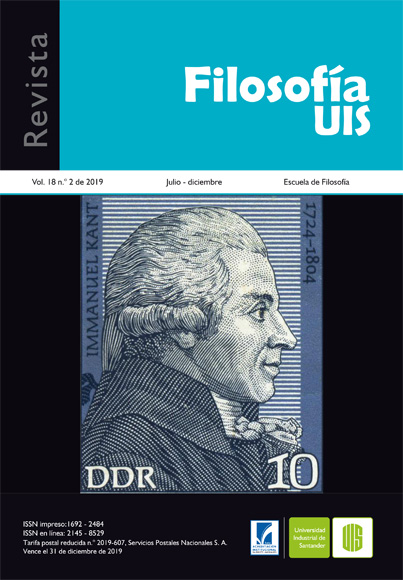The Scientific Realism and the Pessimistic Induction: an open debate
Published 2019-05-13
Keywords
- Pessimistic Induction,
- Scientific Realism,
- Empirical Success,
- Unconceived Alternatives
How to Cite
Copyright (c) 2019 Revista Filosofía UIS

This work is licensed under a Creative Commons Attribution 4.0 International License.
Abstract
The debate between the defenders of certain versions of Scientific Realism and the authors who argue in favor of the pessimistic induction, remains open. This study was made with the objective of showing that the pessimistic induction represents a serious challenge for these versions of Scientific Realism. In the first part of the text I will review some of the different ways to characterize the pessimistic induction, emphasizing the type of realistic commitment with which they argue, that is, whether it is of a semantic, epistemic or metaphysical nature. In the second part I analyze three strategies that have been developed to undermine the pessimistic induction, as well as the counter arguments formulated by the defenders of the pessimistic induction before these attacks. I show that none of these three strategies achieves its objective. I conclude by suggesting a possible line of research on the subject.
Downloads
References
Cevolani, G. y Tambolo, L. (2012). Progress as Approximation to the Truth: A Defence of the Verisimilitudinarian Approach. Erkenntnis, 78, 921-935.
Chang, H. (2003). Preservative Realism and Its Discontents: Revisiting Caloric. Philosophy of Science, 70(5), 902-912.
De Solla, D. (1963). Little science, big science... and beyond. New York: Columbia University Press.
Devitt, M. (2007). Scientific Realism. En F. Jackson y M. Smith (eds.), The Oxford Handbook of Contemporary Philosophy. Oxford: Oxford University Press.
Fahrbach, L. (2011). How the growth of science ends theory change. Synthese, 180, 139-155.
Friedman, M. (1996). Objectivity and History. Review work of The Advancement of Science: Science without Legend, Objectivity without Illusions by Philip Kitcher. Erkenntnis, 44(3), 379-395.
Frost-Arnold, G. (2011). From the Pessimistic Induction to Semantic Antirealism. Philosophy of Science, 78(5), 1131-1142.
Held, C. (2011). Truth does not explain predictive success. Analysis, 41(2), 232-234.
Kitcher, P. (1995). Précis of The Advancement of Science. Philosophy and Phenomenological Research, 55(3), 611-617.
Laudan, L. (1977). Progress and Its Problems, Towards a Theory of Scientific Growth. Berkeley: University of California Press.
Laudan, L. (1981). A Confutation of Convergent Realism. Philosophy of Science, 48(1), 19- 49.
Leplin, J. (1992). Realism and Methodological Change. Proceedings of the Biennial Meeting of the Philosophy of Science Association, 1992(1), 435-445.
Lewis, P. (2001). Why the Pessimistic Induction is a Fallacy. Synthese, 129, 371-380.
McMullin, E. (1984). A Case for Scientific Realism. En J. Leplin (ed.), Scientific Realism. Berkeley: University of California Press.
Mizrahi, M. (2013). The Pessimistic Induction: A Bad Argument Gone too Far. Synthese, 190, 3209-3226.
Niiniluoto, I. (2014). Scientific Progress as Increasing Verisimilitude. Studies in History and Philosophy of Science, 46, 73-77.
Park, S. (2014). A Pessimistic Induction against Scientific Antirealism. Organon F, 21(1), 3-21.
Poincaré, H. (1905). Science and Hypothesis. New York: The Walter Scott Publishing Co.
Psillos, S. (1999). Scientific realism: how science tracks truth. London: Routledge.
Putnam, H. (1975). Mathematics Matter and Method. Philosophical Papers Volume I. Cambridge: Cambridge University Press.
Putnam, H. (1978). Meaning and the Moral Sciences. London: Routledge & K. Paul.
Stanford, K. (2006). Exceeding our grasp: Science, history, and the problem of unconceived alternatives. Oxford: Oxford University Press.
Vickers, P. (2017). Understanding the Selective Realist Defence Against the PMI. Synthese, 194, 3221-3232.
Worrall, J. (1989). Structural realism: The best of both worlds. Dialectica, 43, 99-124.
Wray, B. (2013). Pessimistic induction and the exponential growth of science reassessed. Synthese, 190, 4321-4330.

